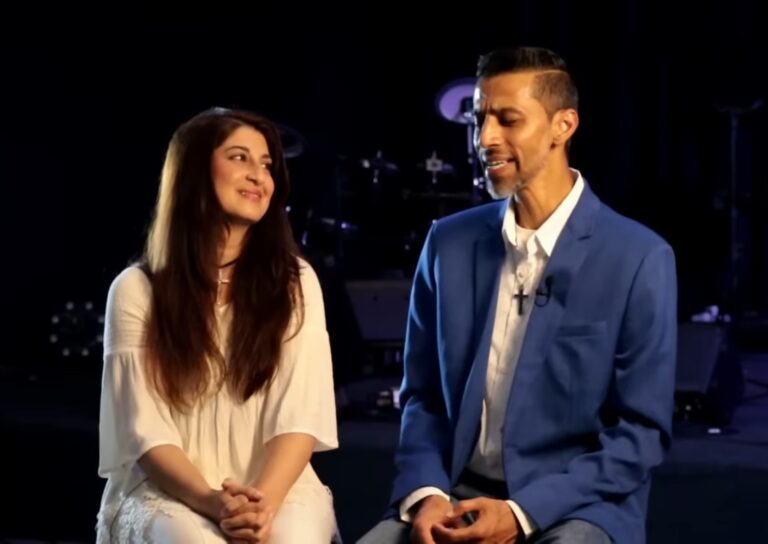By Wesley Moon –
Since none of the Hindu demigods could free Pranisha from the demons that frightened her at night and caused her to fail her midterm exams, her parents called the one aunt who had converted to Christianity.
“Some elders from the church came and they prayed with fervency in my room and
they cast out that demon out of my life,” Pranisha says. “It was the first time that I actually heard the name of Jesus or experienced the power of his holy and precious blood.”
Strangely, Pranisha’s aunt and elders didn’t talk to her about salvation. They didn’t so much as leave a tract explaining the gospel. So before she became a Christian, Pranisha became a Muslim.
Her path out of Hinduism in South Africa comes by way of her husband, with whom she became smitten. Shahid Abdul saw her and pursued her. His friends scoffed. She was way out of his league, they said.
It was the story of Romeo and Juliet. Shahid was Muslim, Pranisha was Hindu. Their families refused to let them have anything to do with each other.
In addition to their being discrepancies of religion, Shahid was a drug addict and a thug with no ambition for life. Pranisha knew that he was one of the kids who hung out by the shop. They were kids who were basically up to no good.
But she agreed to go with a friend on a picnic where there was a beautiful waterfall, she met Shahid. He was handsome and gentlemanly, and she fell for him.
For years, they snuck out to see each other on dates. One time, Shahid had to defend himself in a fistfight with her brother, who threatened to kill him. After years of dating, however, the families relented, and Pranisha and Shahid got married.
“I knew that it was only fit that a woman has to marry a husband and follow his traditions and his beliefs, so I openly and willingly converted to Islam,” she says.
Her family was devastated. His family was elated.
She took her shahada (the Muslim equivalent of the sinner’s prayer for salvation given for Christians). She began reading the Koran. But it struck her odd. Why was Jesus’s name so prevalent in the Koran, and Mohammad’s so scarce (MHMD is mentioned four times in the Koran. Muslims today tell us that MHMD mean Mohammad, but the in consonantal Koran, the original, it may have meant “praise-worthy one” and may have referred to Jesus).
It seemed to her like a repeat of her slow disillusion with Hinduism years earlier. Something was off. “I knew again that I was being misled,” she says. “I knew again that it was not the truth.”
When they got married, Shahid’s drug addiction showed its ugly head. Sometimes, he stole from her for marijuana or other drugs. Sometimes, he didn’t pick her up from work, leaving her stranded (she worked in a call center all night).
They moved from city to city in South Africa, hoping a fresh start would work. But he couldn’t snap the addiction. Finally, she gave him the ultimatum: If he didn’t get professional help, she would leave him.
He heeded her warning. He persuaded her to move back to Cape Town, where he would be surrounded by family and support network.
The plan worked. He never touched drugs again.
Meanwhile in Cape Town at the call center where she worked, Pranisha met Christians. She remembered how only Jesus’s name had freed her from demonic oppression in her childhood. There were verses and worship songs and coincidences that she couldn’t deny.
But the breakthrough epiphany – and we blush to say it – was in her bathroom. Ok, ok. It sounds TMI. But you’ve got to understand that in Islam, by contrast, there are rules for cleanliness. You must wash your hands assiduously to touch the Koran. You must wash to pray, etc.
Pranisha had be fighting Jesus: “You need to leave me alone,” she said. Her husband was Muslim. “I cannot follow you.” For days she was denying Jesus.
Then while she was sitting on the toilet (full blush mode), she looked down at the intricate patterns in the tile on the floor and discerned the face of Jesus. She even took a picture, and his semblance was even clearer in the picture.
“If God himself can reveal his face to me while I was on the toilet,” she thought to herself, “then this God must be real.
“God will meet you anywhere,” Pranisha explains. “God says, Come as you are. It doesn’t matter how dirty your rags are, come as you are and I will give you rest, I will give you peace.”
The contrast between the un-approachableness of Allah (requiring ceremonial cleanings) and willingness of Jesus to go the distance to meet with use dirty humans, this is what convinced Pranisha. The Hindu demigods were deaf, Allah was unapproachable, only Jesus ran to her and met her in her sin and filth.
She began, discreetly, posting verses in their prayer room. At first, Shahid reacted angrily when he found out that his wife was worshipping Jesus as God because Muslims think is only a prophet. He threw her Bible out the front door and told her to follow it.
Pranisha responded calmly, with love.
“Your book says that you can divorce me and you can marry up to seven times, but the Bible says that what God puts together no man will separate,” she replied.
Shahid flashed back through the years: his father’s anger, his father’s struggles with alcoholism, his father’s violence towards his mother, his own drug addiction and Pranisha’s patience to endure it.
“He was dumbfounded and confused,” Pranisha remembers. “This newness about me. I was so peaceful and I was so calm and I was so tolerant for the first time that he had met me and known me for so many years.”
He relented.
Shahid wound up unemployed. For a time, Pranisha became the sole breadwinner. Shahid, meanwhile, stayed home and took care of their child.
And he prayed – to Allah, of course. But Allah didn’t answer.
Meanwhile, he read some of the Bible verses his wife had posted up. He felt an inexplicable peace.
One day, he hit the play button and Hillsong worship came on. It was strange but peace-giving. His spirit was touched.
Their daughter was older and invited Dad to accompany them to church. He always answered no.
“I was still stuck in that whole mindset of wanting to be Muslim but really wanting God to help me,” Shahid explains.
Of course, the daughter, who came back from church glowing service after service, broke him down and he relented and accompanied them. For several services, he fought the promptings of the Holy Spirit but eventually broke down.
When he called his parents to inform them of his conversion to Christianity, “my parents cursed me. I was completely cut off from the family. I’m no longer a son to them,” he explains. He responded that he forgave them and would pray for them.
He got baptized on June 8, 2016, on his birthday.
“I’m so elated knowing Jesus in my life,” he says. “Even in your darkest of moments and there’s no more hope in your life, the hope is in the Lord. Jesus is the answer to anything and everything you have in your life. Jesus is the name above all names.”




